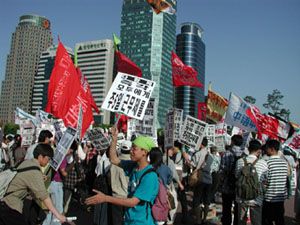
On the day of the Daisy Festival, bills criticizing SGA"s radical stance in its opposition to the war were posted on walls. Even worse, the rain prevented the event from taking place outdoors, thus reduced its publicity.
The 4·19 celebration held on April 18 was also cut short due to the rain. The commemoration was called "The Outcry of the Azalea." It is named so, first of all because such flower is most abundant during this time. Secondly the flower has often been used in literary works as symbols of the masses, the oppressed but those that await a better time. Thus, people gathered on 4·19 looked like dispersed pedals of azaleas.
"This is not a day we merely remember the martyrs of the 43" years past. It is a day we unite with everybody living in the present and resist the inequalities and misdeeds of the world," said the handouts given out by the organizers. "Joint efforts can make a difference. And the students" participation is strictly voluntary. We only ask them to join the movement in any way they feel fit for them," said the President of the SGA, Choe Ji-sun (French Lang & Lit, 4).
On April 30, the day before the Labor Day on May 1, students from universities all around Korea joined workers in rallies to gain their rightful rights as decent laborers. This year, the Labor Day celebrated its 113th anniversar since the Haymarket Massacre in the U.S. in 1886.
Student organizations from Daejeon and Seoul gathered at Yonsei University and held the "4·30 Youth Festival." There were performances by Korean university students, Korean, migrant, and physically challenged workers. Samahaba, a migrant worker from Bangladesh, called for "The unison of migrant workers and Korean workers." And a female worker seated in a wheelchair, a member of the Physically Challenged Females" Coalition, accentuated the double discrimination imposed on the physically impeded female workers for their sex and physical state.
Despite the cold weather, there were students who stayed up all night in support of the oppressed workers. Never giving up, the students showed their continuous fervor on the next day, as they headed toward Kyungchung and Daehakno for further rallies that lasted until late afternoon.
neyessioui@ewha.ac.kr

